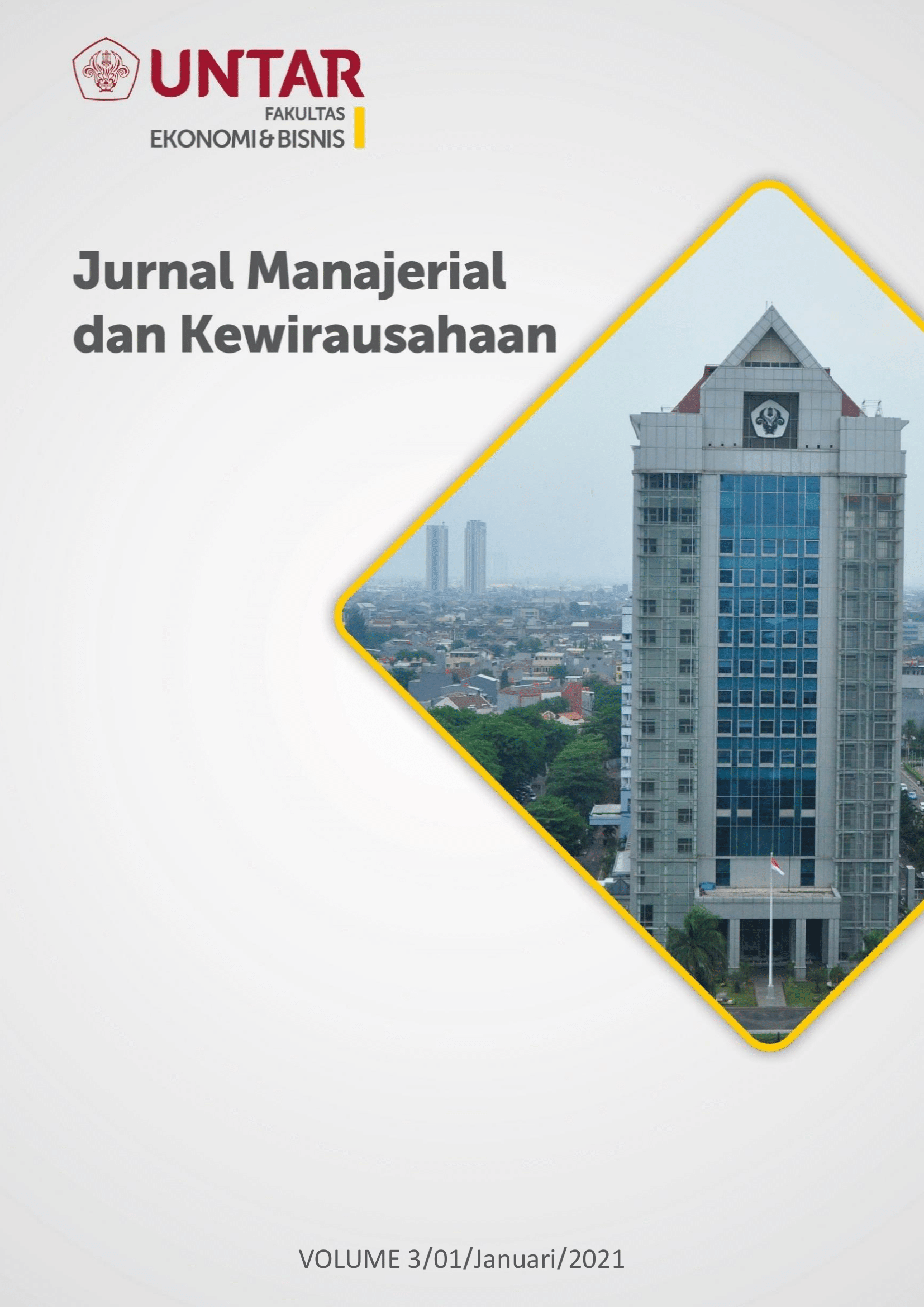Pengaruh Kompensasi Dan Kepemimpinan Terhadap Kepuasan Kerja Karyawan PT X Di Jakarta
Main Article Content
Abstract
The purpose of this study is to determine the effect of compensation and leadership on employee job satisfaction at PT X in Jakarta. Data collection from the sample was carried out using a cross-sectional design method by distributing an online Google Form questionnaire. The sample was collected using a non-probability sampling method with a convenience sampling type with a total of 100 respondents. The data analysis method used is PLS-SEM and it is processed using SmartPLS version 3.3.2 software. The results of this study indicate that there is no significant effect of compensation on job satisfaction. Meanwhile, leadership has a significant positive effect on job satisfaction.
Tujuan dari penelitian ini yaitu untuk mengetahui pengaruh dari kompensasi dan kepemimpinan terhadap kepuasan kerja karyawan pada PT X di Jakarta. Pengumpulan data dari sampel dilakukan dengan menggunakan metode cross-sectional design dengan membagikan kuesioner online Google Form. Sampel dikumpulkan dengan metode non-probability sampling berjenis convenience sampling dengan total 100 responden. Metode analisis data yang digunakan yaitu PLS-SEM dan diolah dengan menggunakan software SmartPLS versi 3.3.2. Hasil penelitian ini menunjukkan tidak terdapat pengaruh yang signifikan kompensasi terhadap kepuasan kerja. Sedangkan kepemimpinan memiliki pengaruh yang positif signifikan terhadap kepuasan kerja.
Article Details
Section
This work is licensed under a Jurnal Muara Ilmu Ekonomi dan Bisnis Creative Commons Attribution-ShareAlike 4.0 International License.,/p>
References
Alshmemri, M., Shahwan-Akl, L., & Maude, P. (2017) “Herzberg’s two-factor theory”. Life Science Journal, 14(5), 12-16.
Ashraf, M. A. (2020) “Demographic factors, compensation, job satisfaction and organizational commitment in private university: an analysis using SEM”. Journal of Global Responsibility, 11(4), 407-436.
Bagozzi, R. P., & Yi, Y. (1988) “On the evaluation of structural equation models”. Journal of the academy of marketing science, 16(1), 74-94
Becker, J. M., Ringle, C. M., & Sarstedt, M. (2018) “Estimating moderating effects in PLS-SEM and PLS-SEM: Interaction term generation data treatment”. Journal of Applied Structural Equation Modeling, 2(2), 1-21.
Dhermawan, A. A. N. B., Sudibya, I. G. A., & Utama, I. W. M. (2012) “Pengaruh motivasi, lingkungan kerja, kompetensi, dan kompensasi terhadap kepuasan kerja dan kinerja pegawai di lingkungan kantor Dinas Pekerjaan Umum Provinsi Bali”. Jurnal Manajemen, Strategi Bisnis, dan Kewirausahaan, 6(2), 173-184.
Hair, J. F., Ringle, C. M., & Sarstedt, M. (2011) “PLS-SEM: Indeed a silver bullet”. Journal of Marketing theory and Practice, 19(2), 139-152.
Hair, J. F., Ringle, C. M., & Sarstedt, M. (2013) “Partial least squares structural equation modeling: Rigorous applications, better results and higher acceptance”. Long range planning, 46(1-2), 1-12.
Hasibuan, M. S. (2006) Organisasi dan motivasi: dasar peningkatan produktivitas. Jakarta: Bumi Aksara. Henseler, J., Ringle, C. M., & Sinkovics, R. R. (2009) “The use of partial least squares path modeling in international marketing”. Advances in International Marketing, 20, 277-319.
Herzberg, F. (1966) Work and the nature of man. New York: World Publishing. Khair, H. (2019) “Pengaruh kepemimpinan dan kompensasi terhadap kepuasan kerja melalui motivasi kerja”. Maneggio: Jurnal Ilmiah Magister Manajemen, 2(1), 69-88.
Kompas. (2018) Kurang Apresiasi, 30 Persen Pekerja Indonesia Ingin Pindah Kerja. Retrieved October, 2020, from https://lifestyle.kompas.com/read/2018/01/02/214530820/kurangapresiasi-30-persen-pekerja-indonesia-ingin-pindah-kerja.
Malhotra, N. K. (2009) Riset pemasaran, edisi keempat, jilid 1. Jakarta: PT Indeks. Mindari, E. (2018) “Pengaruh kompensasi, lingkungan kerja dan kepemimpinan terhadap kepuasan kerja karyawan PT. Bisma Hamirah Palembang”. Jurnal Ecoment Global, 3(1), 35-41.
Pawirosumarto, S., Sarjana, P. K., & Gunawan, R. (2017) “The effect of work environment, leadership style, and organizational culture towards job satisfaction and its implication towards employee performance in Parador Hotels and Resorts, Indonesia”. International Journal of Law and Management, 59(6), 1337-1358.
Priherdityo, E. (2016) Survei: 77 Persen Karyawan Tidak Puas Tunjangan Kerja. Retrieved October, 2020, from https://www.cnnindonesia.com/gaya-hidup/20160127134134-277- 107059/survei-77-persen-karyawan-tidak-puas-tunjangan-kerja.
Reskantika, R., Paminto, A., & Ulfah, Y. (2019) “Pengaruh gaya kepemimpinan dan budaya organisasi serta motivasi terhadap kepuasan kerja dan komitmen organisasi”. Jurnal Manajemen, 11(2), 195-202.
Safitri, D. E., Hariyadi, S., & Prihastuty, R. (2014) “Influence of the compensation by the company giving satisfaction to employee morale in TPKS (Pengaruh kepuasan pemberian kompensasi oleh perusahaan terhadap semangat kerja karyawan di TPKS)”. Journal of Social and Industrial Psychology, 3(1), 13-19.
Sari, L., Sampurno, S., & Wahyono, D. (2014) “Pengaruh kepemimpinan dan budaya organisasi terhadap kepuasan kerja karyawan di Yogyakarta”. Jurnal Manajemen Dan Pelayanan Farmasi (Journal of Management and Pharmacy Practice), 4(1), 33-38.
Sekaran, U., & Bougie, R. (2016) Research methods for business: A skill building approach. United States: John Wiley & Sons.
Wetzels, M., Odekerken-Schröder, G., & Van Oppen, C. (2009) “Using PLS path modeling for assessing hierarchical construct models: Guidelines and empirical illustration”. MIS Quarterly: Management Information Systems, 33(1), 177-195.

